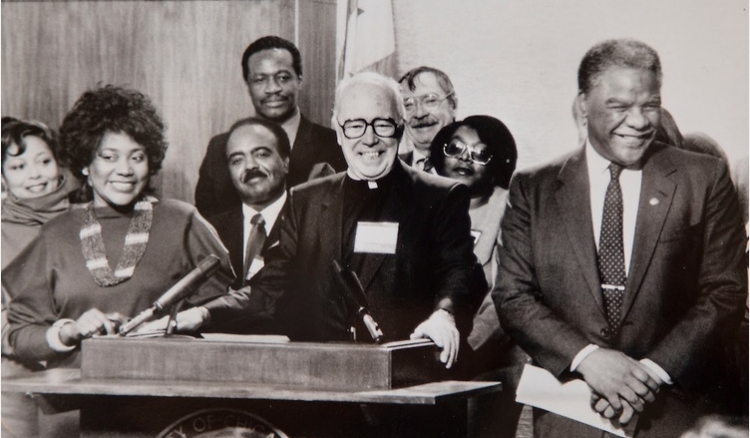
Egan Urban Center: A Brief History
Early Years
The Monsignor John J. Egan Office of Urban Education and Community Partnerships (UECP) was originally founded as the Egan Urban Center (EUC) in 1994 with grants from the John D. and Catherine T. MacArthur Foundation and The Chicago Community Trust. The Center sought to reflect Monsignor Egan's decades-long commitment to promoting labor and housing rights and racial justice and integration in Chicago. In doing so, DePaul significantly expanded opportunities for the university, in collaboration with urban communities, to address critical problems, alleviate poverty, and promote social justice.
Who was Monsignor John J. Egan?
Why was he important to efforts and create racial justice in Chicago?
During the 1990s, the EUC was a vibrant vehicle for DePaul’s engagement with grassroots community organizers and community development professionals throughout Chicago. Under the leadership of Elizabeth Hollander, former Director of Planning for Mayor Harold Washington, and Laurie Worrall, the Assistant Director and future founding Executive Director of the Steans Center, EUC flourished. Large federal grants from HUD and the Department of Education provided a means to partner with community groups in ways that leveraged DePaul’s valuable educational resources to directly support community development projects in housing, education, technology, and job creation within low-income communities. DePaul trustee Harrison Steans was the Chair of the Advisory Board and before the end of the decade, EUC became a force for promoting positive social change throughout many communities on the south, west, and near northwest sides of the city.
EUC was a vital part of the Policy Research Action Group, a consortium of Chicago-based academics and community activists that worked to link research and grassroots activism. PRAG, which consisted of Loyola University, DePaul University, University of Illinois Chicago, and Chicago State University received support from the John D. And Catherine T. MacArthur Foundation, the Department of Education, HUD, and the W.K. Kellogg Foundation.
2000s
In 1998, Dr. Michael Bennett, former Vice-President of Shorebank and subsequently a faculty member and researcher at the College of Urban Planning and Public Affairs and the Jane Addams College of Social Work at UIC, took over the EUC directorship. By the early 2000s, under Dr. Bennett's leadership, EUC expanded its fundraising to a variety of foundations and donors and further developed its tools for collaboration. EUC significantly broadened the number of projects that directly assisted community organizations with their planning and evaluating processes, seeking to improve the effectiveness of their projects, programs, advocacy, and operations. The Center incubated new programs and organizations and focused heavily on assisting communities to build on their assets to address critical urban problems.
By the middle part of the decade, EUC attained a large multi-year Chicago Public Schools grant. The grant was awarded to work with a set of technology public schools facing potential closure on the city’s south and west sides. Moreover, EUC piloted a Black-Latino Dialogue Working Group Initiative that subsequently led to a W.K. Kellogg grant focused on racial healing in Chicago.
Dr. Bennett was able to help institutions leverage their resources to have major, positive impacts on their communities. By helping organizations with their planning processes, evaluating the effectiveness and efficiency of their operations, and helping them improve and enhance their abilities, they’ve addressed critical urban problems by channeling community and economic assistance directly to the people and communities that need it.
One way they did this was to found the Fathers, Families, and Health Communities Collaborative. This initiative focuses on enhancing the capacities of low-income, noncustodial fathers to enrich the lives of their children. Many of these fathers are formerly incarcerated and have suffered long stretches of unemployment.
In 2008, Dr. Bennett became a full-time faculty member in Sociology, and John Zeigler, who had directed the centers' partnerships, took over the directorship of the EUC. During the Winter of 2009, EUC was institutionally repositioned from the College of Liberal Arts and Social Sciences to the Steans Center to more fully engage the EUC with academic service-learning. The Egan Urban Center developed a Certificate in Community Engagement geared toward public agency and nonprofit employees. The initial success of this integration of the centers was evident in the assignment of numerous service-learning students to EUC's public school partners.
Transition to Egan Office of Urban Education and Community Partnerships (UECP)
A part of DePaul's Strategic Plan, Vision 2018, is a commitment to “deepen DePaul’s connection with Chicago and enrich students’ educational experiences.” As part of this effort, in 2013, EUC's programs, personnel, and partnerships were fully integrated into the Steans Center. The Egan Urban Center was renamed the Monsignor Egan Office of Urban Education and Community Partnerships and in addition to its existing grant-funded projects, was repositioned to oversee Catholic School Partnerships and Public School Partnerships at the Steans Center. Given the former EUC's deep reach into Chicago neighborhoods and schools, the shift in structure gave DePaul students a greater opportunity to learn about issues and engage directly in action research, planning, and programming aimed at addressing critical urban problems, alleviating poverty, and promoting social justice. The transition allowed for the expansion of current projects including the strengthening of partnerships with the Chicago Public Schools, Big Shoulders schools, and programs with military veterans. UECP is today a vibrant base for generating new and innovative collaborations with DePaul faculty members, students, and community partners, intensifying Monsignor Egan's commitment to actively address the most urgent issues of Chicago.